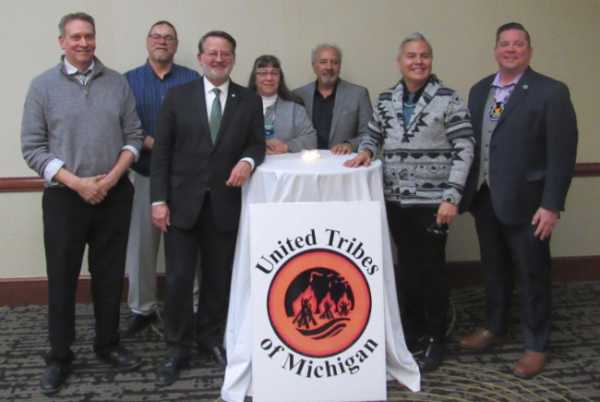
- Details
- By Levi Rickert
LANSING, Mich. — With Congress in recess because of Presidents Day, U.S. Sen. Gary Peters (D-MI) spent Wednesday afternoon visiting the United Tribes of Michigan in Lansing by providing tribal leaders with a legislative update.
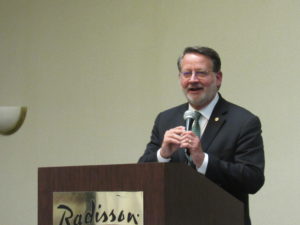 Sen. Gary Peters
Sen. Gary Peters
Wednesday’s meeting was Sen. Peters’ second visit to the organization that brings together leaders of the 12 federally recognized Michigan tribes periodically throughout the year.
Peters, who is in his first term and faces reelection in November, told the friendly crowd of tribal leaders that he has visited almost all Michigan tribes and said he welcomes invitations to visit tribes.
Peters emphasized his ongoing commitment to Indian Country, including his support for the Indian Child Welfare Act, tribal provisions in the 2018 Farm Bill and protecting the Great Lakes from invasive species.
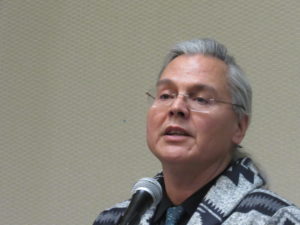 Sault Ste. Marie Tribe chairperson and president of United Tribes of Michigan Aaron Payment
Sault Ste. Marie Tribe chairperson and president of United Tribes of Michigan Aaron Payment
During a Q&A session, United Tribes of Michigan President Aaron Payment, who is chairperson of Sault Ste. Marie Tribe of Chippewa Indians, thanked Peters for his support and leadership for the Great Lakes Restoration Initiative and pushing for bipartisan support for funding.
“You can count us to keep doing this. The President seems to always want to zero it out or reduce it by 90 percent, with the exception of this year which is an election year where he put funds back in for it, we always seem to find a way—working across the aisle—to put funds back in as a Michigan delegation,” Peters said.
Nottawaseppi Huron Band of the Potawatomi Chairperson Jaime Stuck discussed tribes’ efforts to grow tribal economies through non-gaming economic development. He encouraged Peters to review Senate Bill 212 that passed the Senate last year, but is lingering in the House of Representatives. The bill would “amend the Native American Business Development, Trade Promotion, and Tourism Act of 2000, the Buy Indian Act, and the Native American Programs Act of 1974 to provide industry and economic development opportunities to Indian communities.”
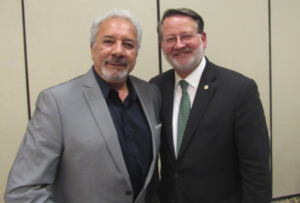 Little River Band of Ottawa Indians Ogema Larry Romanelli with Sen. Peters
Little River Band of Ottawa Indians Ogema Larry Romanelli with Sen. Peters
Little River Band of Ottawa Indians Ogema Larry Romanelli emphasized the need to move American Indians from the “other” category in data reporting.
“In the scheme of things, Native Americans are the invisible group. Native Americans are not even on some lists such as unemployment. You see it in newspapers all the time. When reporting, they trail off and we aren’t even mentioned,” Romanelli said.
Chief Tim J. Davis of the Saginaw Chippewa Tribe asked Peters to work to increase funds for law enforcement for tribes and counties in Michigan.
Peters said he is very supportive of law enforcement and encouraged tribes to take advantage of grants that are available. The senator said his staff is willing to assist with grant submissions with letters of support and can make referrals for technical assistance in the federal grant process.
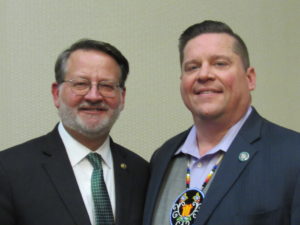 Sen. Peters with Nottawaseppi Huron of the Potawatomi Chairperson Jaime Stuck
Sen. Peters with Nottawaseppi Huron of the Potawatomi Chairperson Jaime Stuck
Payment mentioned he is a strong proponent of tribes having funds directly allocated to tribes through formula funding versus competitive grant process. He also said tribes should be allocated funds directly rather than going through states.
“Competitive grants do not fulfill the treaty and trust responsibilities to tribes. Funds should be given directly to tribes because we have already paid for our share because we have given over 500,000 acres in Michigan and over 14 million through the core tribes,” Payment said.
Peters said he agreed.
More Stories Like This
Native News Weekly (August 25, 2024): D.C. BriefsUS Presidents in Their Own Words Concerning American Indians
Merry Christmas 2025
Navajo Man Faces Vehicular Homicide Charge After Child Killed at Navajo Nation Christmas Parade
Next on Native Bidaské: Lumbee Tribal Chairman John Lowery
Help us defend tribal sovereignty.
At Native News Online, our mission is rooted in telling the stories that strengthen sovereignty and uplift Indigenous voices — not just at year’s end, but every single day.
Because of your generosity last year, we were able to keep our reporters on the ground in tribal communities, at national gatherings and in the halls of Congress — covering the issues that matter most to Indian Country: sovereignty, culture, education, health and economic opportunity.
That support sustained us through a tough year in 2025. Now, as we look to the year ahead, we need your help right now to ensure warrior journalism remains strong — reporting that defends tribal sovereignty, amplifies Native truth, and holds power accountable.
 The stakes couldn't be higher. Your support keeps Native voices heard, Native stories told and Native sovereignty defended.
The stakes couldn't be higher. Your support keeps Native voices heard, Native stories told and Native sovereignty defended.
Stand with Warrior Journalism today.
Levi Rickert (Potawatomi), Editor & Publisher

